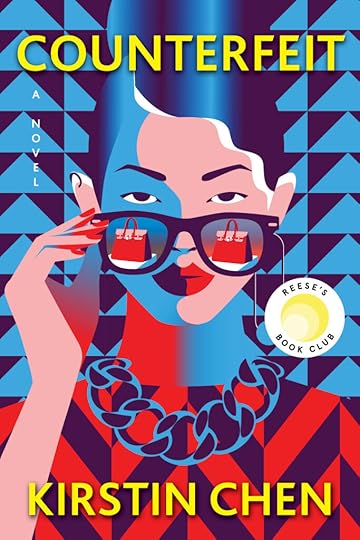A Review of Kirstin Chen’s Counterfeit (William Morrow, 2022)
![[personal profile]](https://i.gr-assets.com/images/S/compressed.photo.goodreads.com/hostedimages/1491408111i/22407843.png) lsobiesk
lsobiesk

Written by Stephen Hong Sohn
Edited by Lizzy Sobiesk
As of late, there have been a ton of takedowns of the model minority myths, with an emphasis of folx working through underhanded means. In this case, the novel posits Ava as the proverbial model minority housewife, who is somehow roped into this designer handbag knockoff scheme. The novel’s set up is crucial to the way that Chen sets up readers for a major surprise. The first half of the novel is completed in a monological perspective, with Ava speaking in the first person as if she is being interviewed by a detective. Eventually, we know she has turned herself in, and she is using this narrative to explain why she was involved with Winnie in the first place. It becomes evident that Ava is detailing her connection because she wants to minimize her criminal involvement, with the hopes that she will receive lighter sentencing. Here, I will pause to let you know that I will be revealing some key spoilers, so look away unless you want to know how this one ends. Eventually, the novel turns to the third person perspective, and we see that Winnie is hiding out in China. She hopes to lay low until she can figure out her next move. We discover that Winnie is still in touch with Ava through burner phones that that Ava’s so-called “confession” is anything but. Indeed, Ava has been plotting a way through so that Ava might receive a lesser punishment, while Winnie takes the fall. Winnie’s part is to undergo cosmetic surgeries to ensure that she will look different enough, so that she can return to the United States under a different identity. The hope is that Ava and Winnie might work together on an alternative, legitimate business. The first half of the novel makes it seem like Winnie is the mastermind, but the shift reveals that both characters are quite clever, and that their working together is a sort of move toward a subversively constituted partnership that reminds one of Thelma and Louise. I especially appreciated this major shift, because the first half made me extremely suspicious of Ava, to the point where I am surprised that the plan actually worked. The whole time I had been thinking that Ava is making it seem like she had been manipulated by Winnie when it seemed as though Ava had way more agency than what was being communicated. In any case, Chen must have been anticipating this response, because it shows that Ava is already an unreliable narrator, which is where the novel ultimately moves. This ending does remind me about how strong Asian American female characters, who end up coming together in this way, come off as a very satisfying pairing that you actually do want to root for. The larger critiques that the novel seems to be making about elite consumption and global capitalism are harder to parse out, but there is a sense that the upwardly mobile Asian American is tasked with reconsidering her place in a larger social structure in which she can (or not) be an agent for social justice in some capacity.
Buy the Book Here
 comments
comments



